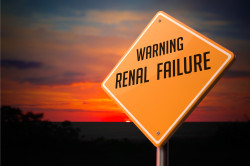Top Class Actions’s website and social media posts use affiliate links. If you make a purchase using such links, we may receive a commission, but it will not result in any additional charges to you. Please review our Affiliate Link Disclosure for more information.

The FDA warned in May 2015 that treatment with this medication can lead to diabetic ketoacidocis, a condition that if not timely treated can lead to Invokana renal failure.
What is Invokana?
Invokana is a relatively new drug, part of a class of drugs called SGLT2 inhibitors that are used to help regulate blood sugar levels in adult patients with Type 2 diabetes.
According to the Mayo Clinic, Type 2 diabetes is a condition that affects the body’s ability to break down sugar (glucose) as an energy source.
Insulin is the body’s means of breaking down sugar in the blood for its cells to have energy, and Type 2 diabetes either causes the body to resist the effects of insulin, or to produce inadequate amounts. If glucose levels in the blood are too high, it can be dangerous and cause health complications.
Along with other members of the SGLT2 inhibitor class, Invokana works by triggering the kidneys to take sugar from the body through the urine to lower blood sugar levels.
But these kinds of drugs can come with risks, including ketoacidosis, kidney complications, dehydration, higher blood cholesterol levels, and low blood sugar when an SGLT2 inhibitor is combined with another diabetes medication. One of the more concerning Invokana side effects includes Invokana renal failure.
Symptoms of Invokana Renal Failure
Renal failure occurs due to damage to the functions of the kidneys that lead to failure of the normal filtration process. This could be sudden or rapid in onset in cases of acute renal injury or damage or acute renal failure.
There are many symptoms of acute kidney failure associated with diabetic ketoacidosis from patients taking Invokana. Patients should pay special attention to these Invokana renal failure symptoms to avoid permanent damage:
- Bloody stools
- Breath odor and metallic taste in the mouth
- Changes in mental status or mood
- Decreased appetite
- Decreased sensation in the hands or feet
- Unusual fatigue
- Flank pain (between the ribs and hips)
- High blood pressure
- Prolonged nausea or vomiting
- Nosebleeds and prolonged bleeding
- Seizures
- Shortness of breath
- Slow, sluggish movements
- Swelling due to the body keeping in fluid (may be seen in the legs, ankles, and feet)
- Urination changes
Patients are advised to see their doctor or visit a hospital emergency department if these symptoms occur so that treatment can begin to prevent serious injury or harm. Physicians may discontinue the use of Invokana to prevent any permanent kidney damage.
FDA Warns of Invokana Risks
On May 15, 2015, the FDA issued a safety communication regarding SGLT2 inhibitors, including Invokana, on the basis that the drugs may lead to ketoacidosis, a serious condition where the body produces high levels of blood acids called ketones that may require hospitalization.
Invokana risks may include the following injuries or complications:
- Ketoacidosis, which may lead to diabetic coma or death
- Cardiovascular complications
- Kidney damage or Renal failure
- Bone fracture risk
- Decreased bone mineral density
The FDA Adverse Event Reporting System (FAERS) database identified 20 cases of acidosis reported as diabetic ketoacidosis (DKA), ketoacidosis, or ketosis in patients treated with SGLT2 inhibitors from March 2013 to June 6, 2014.
All patients required emergency room visits or hospitalization for treatment. Since June 2014, the FDA has continued to receive additional reports for DKA in patients treated with SGLT2 inhibitors like Invokana.
Invokana Lawsuits
If you or someone you care about suffered renal failure from taking Invokana, you may be entitled to compensation for injuries caused by Invokana renal failure. An experienced Invokana attorney can review your claim and answer your questions in a free and confidential consultation.
In general, Invokana lawsuits are filed individually by each plaintiff and are not class actions.
Do YOU have a legal claim? Fill out the form on this page now for a free, immediate, and confidential case evaluation. The attorneys who work with Top Class Actions will contact you if you qualify to let you know if an individual lawsuit or class action lawsuit is best for you. Hurry — statutes of limitations may apply.
ATTORNEY ADVERTISING
Top Class Actions is a Proud Member of the American Bar Association
LEGAL INFORMATION IS NOT LEGAL ADVICE
Top Class Actions Legal Statement
©2008 – 2024 Top Class Actions® LLC
Various Trademarks held by their respective owners
This website is not intended for viewing or usage by European Union citizens.
Get Help – It’s Free
Join a Free Invokana Class Action Lawsuit Investigation
If you or a loved one suffered ketoacidosis or kidney failure after taking Invokana, you may have a legal claim. See if you qualify to pursue compensation and join a free diabetes medication class action lawsuit investigation by submitting your information for a free case evaluation.
An attorney will contact you if you qualify to discuss the details of your potential case.
Please Note: If you want to participate in this investigation, it is imperative that you reply to the law firm if they call or email you. Failing to do so may result in you not getting signed up as a client, if you qualify, or getting you dropped as a client.
Oops! We could not locate your form.












